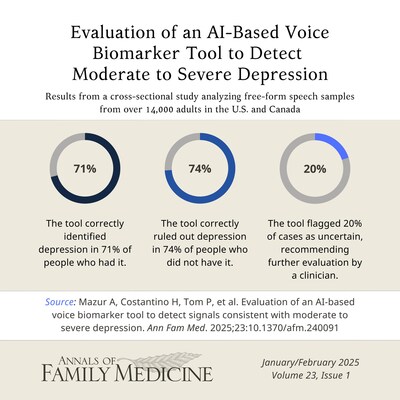Annals of Family Medicine: Four New Articles Provide Insights and Research Results for AI in Primary Care
PROVIDENCE, R.I., Jan. 14, 2025 /PRNewswire/ -- Annals of Family Medicine is proud to announce the early online publication of four impactful articles focusing on artificial intelligence (AI) and its role in primary care. These articles, now available as early access ahead of their inclusion in the January/February 2025 issue, offer valuable insights into AI's applications in health care delivery, mental health screening, clinician burnout, and publishing.
1. How AI Could Transform Family Medicine—If Used Wisely
Written by associate editors of Annals of Family Medicine, the editorial 'The AI Moonshot: What We Need and What We Do Not' highlights how current AI development often misses the mark by producing tools that fail to meet the real needs of family physicians. The authors advocate for a shift in focus toward AI solutions that reduce administrative burdens and prioritize meaningful physician-patient interactions. They urge family physicians to articulate a clear vision for AI that serves them and their patients effectively.
2. AI in Primary Care: Start With the Problem
A special report, titled 'For AI in Primary Care, Start With the Problem,' emphasizes that successful AI adoption must begin with identifying specific, actionable challenges. With over half of their 11-hour workdays spent on EHR tasks, the author highlights the importance of addressing clear needs that AI could target in key areas such as documentation, chart reviews, medication management, and patient communications.
3. AI-Based Voice Biomarker Tool Shows Promise in Detecting Moderate to Severe Depression
A study titled 'Evaluation of an AI-Based Voice Biomarker Tool to Detect Signals Consistent With Moderate to Severe Depression' evaluated a machine learning tool designed to analyze vocal patterns for signs of depression. Key findings include:
- The tool demonstrated a sensitivity of 71%, meaning it correctly identified depression in 71% of people who had it.
- Specificity was 74%, indicating that the tool correctly ruled out depression in 74% of people who did not have it.
- In about 20% of cases, the tool flagged results as uncertain, recommending further evaluation by a clinician.
While not a replacement for clinical evaluations, the AI tool has the potential to serve as a decision-support system in primary care. Because the tool runs in the background, it has the potential to increase depression screening rates in primary care without adding burden to physicians or patients. These preliminary findings underscore the need for further research to refine the technology and explore its integration into clinical workflows.
4. A Unified Framework for Responsible AI Use in Family Medicine
Authored by editors of leading family medicine journals, the editorial 'Use of AI in Family Medicine Publications: A Joint Editorial From Journal Editors' outlines key principles for integrating AI into academic publishing. The authors advocate for ethical AI adoption to improve accessibility for non-native English speakers and streamline research workflows while safeguarding scientific integrity.
Articles Cited:
The AI Moonshot: What We Need and What We Do Not
José E. Rodríguez, MD, FAAP; Yves Lussier, MD, FACMI
For AI in Primary Care, Start With the Problem
John Thomas Menchaca, MD
Alexa Mazur; Harrison Costantino, MS; Prentice Tom, MD; Michael P. Wilson, MD, PhD; Ronald G. Thompson, PhD
Use of AI in Family Medicine Publications: A Joint Editorial From Journal Editors
Sarina Schrager, MD, MS; Dean A. Seehusen, MD, MPH; Sumi Sexton, MD; Caroline R. Richardson, MD; Jon Neher, MD; Nicholas Pimlott, MD; Marjorie A. Bowman, MD; José Rodríguez, MD; Christopher P. Morley, PhD; Li Li, MD, PhD, MPH; James Dom Dera, MD
Read the full articles and explore visual abstracts at www.AnnFamMed.org
Annals of Family Medicine is an open access, peer-reviewed, indexed research journal that provides a cross-disciplinary forum for new, evidence-based information affecting the primary care disciplines. Launched in May 2003, Annals of Family Medicine is sponsored by seven family medical organizations, including the American Academy of Family Physicians, the American Board of Family Medicine, the Society of Teachers of Family Medicine, the Association of Departments of Family Medicine, the Association of Family Medicine Residency Directors, the North American Primary Care Research Group, and the College of Family Physicians of Canada. Annals of Family Medicine is published online six times each year, charges no fee for publication, and contains original research from the clinical, biomedical, social, and health services areas, as well as contributions on methodology and theory, selected reviews, essays, and editorials. Complete editorial content and interactive discussion groups for each published article can be accessed for free on the journal's website, www.AnnFamMed.org.
![]() View original content to download multimedia:https://www.prnewswire.com/news-releases/annals-of-family-medicine-four-new-articles-provide-insights-and-research-results-for-ai-in-primary-care-302349718.html
View original content to download multimedia:https://www.prnewswire.com/news-releases/annals-of-family-medicine-four-new-articles-provide-insights-and-research-results-for-ai-in-primary-care-302349718.html
SOURCE Annals of Family Medicine



